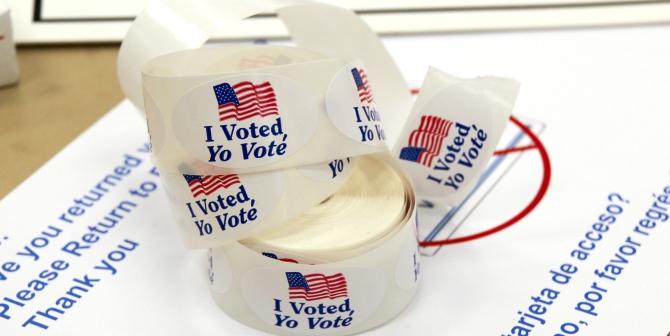 Even among Democratic loyalists President Joe Biden’s performance in Thursday night’s presidential debate against former President Donald Trump has been seen as disappointing or even cataclysmic. In this Q&A, Thomas Gift looks at the performance of both candidates in the debate and examines if – and how – the Democrats might replace Joe Biden before the presidential election.
Even among Democratic loyalists President Joe Biden’s performance in Thursday night’s presidential debate against former President Donald Trump has been seen as disappointing or even cataclysmic. In this Q&A, Thomas Gift looks at the performance of both candidates in the debate and examines if – and how – the Democrats might replace Joe Biden before the presidential election.
What did you think of Biden’s performance last night?
Joe Biden’s only job last night was to demonstrate that, at age 81, he’s capable of serving four more years in office. For Democrats, the consensus seems to be that the incumbent president’s performance ranged from disappointing to downright cataclysmic. Debates don’t matter until they do. And I think this debate mattered. Biden was incoherent at times. He didn’t project. He struggled to maintain his train of thought. That’s the assessment not just from Republicans, but from Democratic surrogates, campaign operatives, advisers, and lawmakers. If you just read the transcript of the debate, maybe last night was a draw, or a slight advantage to Trump. But Americans don’t read the transcript. They look at the performance. Debates are theater. And on the biggest night so far of his campaign, Biden proved incapable of defending his own record, much less attacking Trump for being the threat to democracy that he insists that he is.
How did Trump perform?
Amid all the negative buzz over Biden, what gets lost in the discussion is that Trump performed well in the debate. This shouldn’t have been a huge surprise to anyone. Trump is an entertainer. He’s won debates in the past. There’s a reason why, in 2016, Trump became the Republican nominee. It’s because he blew through his competition on the debate stage. Sometimes Trump is his own worst enemy by going overboard with insults, ad hominem attacks, and interruptions. But I think the mute button saved Trump from himself by not allowing his typical bombastic personality to dominate. Trump came off as more restrained and disciplined than we’re used to seeing him. Credit there goes to his campaign staff. Trump told plenty of lies and half-truths last night. But Biden couldn’t fact check him on the fly. In the places where Trump was most vulnerable, like on the abortion issue, he was able to duck most of Biden’s jabs.
Is there any chance Democrats will force Biden to step aside in the upcoming election?
For Democrats, the problem in calling for Biden to step down in 2024 is that it’s treading into the unknown. The risk with changing horses midstream is that you don’t know what you’re going to get. Names like California Governor Gavin Newsom, Michigan Governor Gretchen Whitmer and, of course, Vice President Kamala Harris are certainly being talked about in the “smoke-filled” rooms of the Democratic Party machine. But there’s no obvious heir apparent. Harris is even less popular than Biden, and Newsom and Whitmer haven’t been vetted on the national stage. Ultimately, this is Biden’s call, and he’s shown no interest in bowing out. In the short-term, expect Biden’s campaign to blitz the airwaves with anti-Trump ads, and see where everyone stands when the dust settles. This late in the game, it’s going to be hard to replace Biden simply because it would create so much discord in the party. The result would be chaos at August’s Democratic convention.
What’s the process by which Biden could be replaced?
The only two options for replacing Biden are: 1) for another candidate to throw his or her hat into the ring in an open nominating process; or 2) for Biden to bow out voluntarily and for other candidates to compete for the nomination at the convention. Option 1 is virtually impossible to imagine. Biden gained roughly 95 percent of pledged Democratic delegates during the primaries. Pledged delegates aren’t legally bound to support Biden. But a widespread revolt is implausible because many of these individuals are longtime Biden loyalists. Option 2 – where Biden declines to accept the nomination – would essentially create a free-for-all at the convention. Pledged delegates would no longer remain committed. And we could see any number of potential candidates vie for their support. Super-delegates, who are party leaders, would also have a say if no candidate emerged with more than 50 percent of delegates on the first ballot.
- Featured image: “733252” by pxhere is CC 0 Public Domain
- Please read our comments policy before commenting.
- Note: This article gives the views of the author, and not the position of USAPP – American Politics and Policy, nor the London School of Economics.
- Shortened URL for this post: https://wp.me/p3I2YF-e2P






